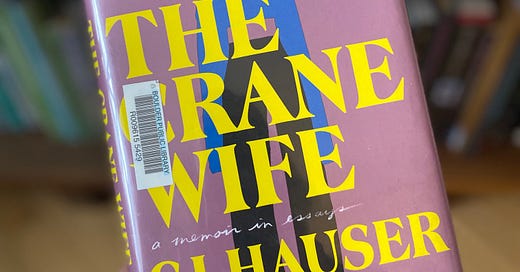June Memoir of the Month: The Crane Wife
A book of essays examining what we should expect from others and ourselves.
**Reader question: Should I continue to write reviews of books I don’t recommend reading? Leave a comment and let me know. Also, I finished next month’s memoir, and I think you are going to love it!**
The Crane Wife (2022)
by CJ Hauser
In Hauser’s title essay “The Crane Wife,” published in the Paris Review in 2019, she writes about breaking off an engagement and traveling to Texas to conduct research on whooping cranes. The essay got more than a million views.
The book continues along the same theme of family and relationships, with a dedication that reads the following:
In gratitude for
the family we are given
the families we are choosing
& ideas of home with enough room for both
She writes about young love and regret, being single in your thirties, and dating divorced men knowing she wasn’t the first or only love of his life. Hauser uses fictional characters as a means of deciphering who she is and why she’s made certain choices.
For example, in the essay “Hepburn Qua Hepburn,” she writes twenty-two pages on how the 1940 movie The Philadelphia Story revealed her own preferences for certain types of men. Each of the three male characters represented a certain kind of man, but since I hadn’t seen the movie, I had a hard time keeping them straight.
In her essay, “Lady with the Lamp,” she travels to the Defense Advanced Research Projects Agency (DARPA) Robot Challenge, a government-funded program to research using robots as first responders. I couldn’t remember how she connected the lamp lady with the robots, so I went back to re-read it:
The DRC was a casting call for a robotic savior, and I wanted to be there to learn from them. Because saving people was something I thought I knew a little bit about. Back then I thought that was what it meant to be in love.
She writes about dating men she wants to save. The men she chooses are “difficult” and “eccentric.” They are the kind of guys her friends withhold opinions about until she is no longer dating them.
She names this desire Florence Nightingale Syndrome after a nurse in the 1800s who fell in love with her patients. Except Florence didn’t fall in love. That turned out to be a false narrative (and a non sequitur that takes up a full page of explanation).
Hauser decides that caretaking isn’t her issue, but rather her conflation of caretaking and love that causes her problems. Saving these men, she decides, was easier than looking inward and asking why she was choosing these men in the first place. Was saving someone the same as loving them?
She tells the story of a boyfriend who wanders off while they are camping on a deserted island. She returns to their campsite to find him zipped up in the tent, going to sleep without her. One of my boyfriends used to walk a few paces ahead of me. These are similar traits. Haven’t we all thought we loved someone who wasn’t quite right for us? Maybe choosing problematic guys doesn’t have to be a referendum on her personal failings. Maybe her decisions about who to date say less about her and more about the men.
There’s an essay devoted to Mulder and Scully from The X-files, another show I never watched, and I couldn’t muster any excitement around why she views herself as Scully, and then later in the essay, as Mulder. The question Hauser seems to be asking is what kind of person am I, and why have I chosen these people to be with?
Her methods for answering this question may appeal to other readers, but I found the references to television and movies tedious. That said, the book is at times funny and insightful. Hauser is a clear master of the personal essay, interpreting situations and connecting concepts in unexpected and clever ways, all in around 5,000 words. If you loved the title essay, you may enjoy the book more than I did.





Mixed or bad reviews can be as compelling and informative as positive ones. I find I usually read to the (bitter!) end of a book I am not particularly enjoying, probably in hopes that there will appear a redeeming quality. So if you can do so, read to the end of a disappointing book, to give others a heads up. Or not...! My good fortune is there are so many excellent books out there that I hear about and read that I’m rarely disappointed. Thanks for another interesting review, Christie!